Related Research Articles

Smiley Smile is the twelfth studio album by the American rock band the Beach Boys, released on September 18, 1967. Conceived as a simpler and more relaxed version of their unfinished Smile album, Smiley Smile is distinguished for its homespun arrangements, "stoned" aesthetic, and lo-fi production. Critics and fans generally received the album and its lead single, "Heroes and Villains", with confusion and disappointment. The album reached number 9 on UK record charts, but sold poorly in the U.S., peaking at number 41—the band's lowest chart placement to that point.
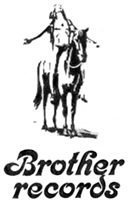
Brother Records, Inc. (BRI) is an American holding company and record label established in 1966 that owns the intellectual property rights of the Beach Boys, including "The Beach Boys" trademark. It was founded by brothers Brian, Carl and Dennis Wilson, and their cousin Mike Love. As of 2011, the corporation was equally owned by four shareholders and directors: Brian Wilson, Mike Love, Al Jardine, and the estate of Carl Wilson.

Holland is the 19th studio album by American rock band the Beach Boys, released January 8, 1973 on Brother/Reprise. It is their first album recorded without Bruce Johnston since 1965, their second with Blondie Chaplin and Ricky Fataar, and their final studio album created under the de facto leadership of Carl Wilson and manager Jack Rieley. The LP was originally packaged with a bonus EP, Mount Vernon and Fairway, which consisted of a 12-minute fairy tale written and produced by Brian and Carl Wilson.
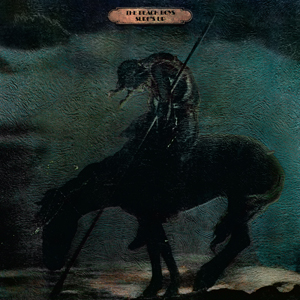
Surf's Up is the 17th studio album by American rock band the Beach Boys, released on August 30, 1971 on Brother/Reprise. It received largely favorable reviews and reached number 29 on the U.S. record charts, becoming their highest-charting LP of new music in the U.S. since 1967. In the UK, Surf's Up peaked at number 15, continuing a string of top 40 records that had not abated since 1965.

Carl and the Passions – "So Tough" is the 18th studio album by American rock band the Beach Boys, released May 15, 1972 on Brother/Reprise. The album is a significant musical departure for the band and is the first to feature the Flames' Blondie Chaplin and Ricky Fataar as additions to their official line-up. It sold poorly and was met with lukewarm reviews, but later gained stature as a cult favorite among fans.

"Good Vibrations" is a song by the American rock band the Beach Boys that was composed by Brian Wilson with lyrics by Mike Love. It was released as a single on October 10, 1966 and was an immediate critical and commercial hit, topping record charts in several countries including the United States and the United Kingdom. Characterized by its complex soundscapes, episodic structure and subversions of pop music formula, it was at the time the most expensive single ever recorded. "Good Vibrations" later became widely acclaimed as one of the finest and most important works of the rock era.
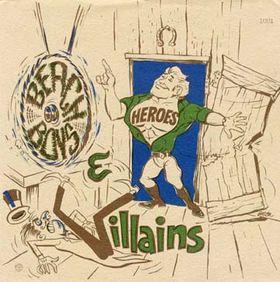
"Heroes and Villains" is a song by the American rock band the Beach Boys from their 1967 album Smiley Smile and their unfinished Smile project. Written by Brian Wilson and Van Dyke Parks, Wilson envisioned the song as an Old West-themed musical comedy that would surpass the recording and artistic achievements of "Good Vibrations". The single was Brother Records' first release. While it failed to meet critical and commercial expectations, it was nevertheless a hit record, peaking at number 12 in the U.S. and number 8 in the UK.
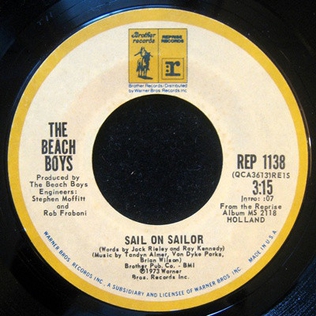
"Sail On, Sailor" is a song by American rock band the Beach Boys from their 1973 album Holland. It was written primarily by Van Dyke Parks and Brian Wilson with Ray Kennedy, Tandyn Almer, and Jack Rieley. The lead singer on the song is Blondie Chaplin, making this one of the band's few well-known songs not sung by Mike Love, Brian Wilson or Carl Wilson. The song was released as a single in 1973, backed with "Only with You", and peaked at No. 79 on the Billboard singles chart. A 1975 reissue charted higher, at No. 49.

"Surf's Up" is a song recorded by the American rock band the Beach Boys that was written by Brian Wilson and Van Dyke Parks. It was originally intended for Smile, an unfinished Beach Boys album that was scrapped in 1967. The song was later completed by Brian and Carl Wilson as the closing track of the band's 1971 album Surf's Up.
"Wonderful" is a song by the American rock band the Beach Boys from their 1967 album Smiley Smile and their unfinished Smile project. Written by Brian Wilson and Van Dyke Parks, it was their only collaboration that resulted in a love song, telling the story of a young girl's sexual awakening and its disruption of her devotion to God and her parents.

"Cabinessence" is a song by the American rock band the Beach Boys from their 1969 album 20/20 and their unfinished Smile project. Written by Brian Wilson and Van Dyke Parks, Wilson described the song as a "rock and roll waltz" about railroads, while Parks offered that the pair were attempting to write a song that would end on "a freeze frame of the Union Pacific Railroad". The instrumentation includes banjo, cello, dobro, bouzouki, fuzz bass, trumpet, accordion, and percussion that was arranged to sound like the pounding of rail spikes.
"Wind Chimes" is a song by the American rock band the Beach Boys from their 1967 album Smiley Smile and their unfinished Smile project. Written by Brian Wilson and Van Dyke Parks, it was inspired by wind chimes hanging outside Wilson's home and was one of the first pieces tracked for the Smile sessions.
"Vegetables" is a song by American rock band the Beach Boys from their 1967 album Smiley Smile and their unfinished Smile project. Written by Brian Wilson and Van Dyke Parks, the song was conceived by Wilson as a tongue-in-cheek promotion of organic food. Another reported inspiration for the song was a humorous comment Wilson heard about the effect of marijuana turning him and his friends into a "vegetative" state.
"Fire" is an instrumental by American musician Brian Wilson that he originally composed for the Beach Boys' never-finished album Smile. Named after Catherine O'Leary and the Great Chicago Fire, the track was originally conceptualized as part of "The Elements", a four-part movement based on the four classical elements: Air, Fire, Earth, and Water. Wilson's friends, family, and colleagues later referred to its recording as heralding his period of psychosis and the unraveling of the Smile project.
"Do You Like Worms?" is a song by American rock band the Beach Boys from their unfinished album Smile. Written by Brian Wilson and Van Dyke Parks, the song is about the recolonization of the American continent and contains references to the Sandwich Islands and "Bicycle Rider Back" playing cards. None of the lyrics appear to mention worms; asked about the title, Parks said he could not remember where it came from, although in a Reddit AMA, Wilson stated that Parks had come up with it.
"Look" is an incomplete musical piece that was composed by American musician Brian Wilson for the Beach Boys' aborted Smile album. Wilson produced the backing track at the start of the Smile sessions in August 1966. It is theorized that a missing session tape may have contained a vocal track that he recorded with his bandmates in October.

Smile is an unfinished album by the American rock band the Beach Boys that was intended to follow their 1966 album Pet Sounds. It was to be an LP of twelve tracks assembled from modular fragments, the same editing process used for their "Good Vibrations" single. Instead, after a year of recording, the album was shelved and the group released a downscaled version, Smiley Smile, in September 1967. Over the next four decades, few of the original Smile tracks were officially released, and the project came to be regarded as the most legendary unreleased album in popular music history.

Lei'd in Hawaii is an unfinished live album by American rock band the Beach Boys that was produced shortly after the completion of their 1967 studio album Smiley Smile. It was initially planned to include the band's first live concert performances since their tour of Europe in May 1967.
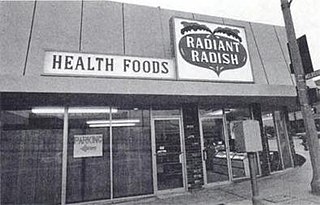
The Radiant Radish was a health food store located at the corner of Melrose Avenue and San Vicente Boulevard in West Hollywood, California, from 1969 to 1971. It was managed by Brian Wilson of the Beach Boys, his cousin Steve Korthoff, and friend Arny Geller.
"Holidays" is an instrumental by the American rock band the Beach Boys that was composed by Brian Wilson for their never-finished Smile album. In 2003, it was rewritten with new lyrics by Van Dyke Parks as "On a Holiday" for the project Brian Wilson Presents Smile (2004).
References
Note
References
- 1 2 3 4 5 Priore, Domenic (2005). Smile: The Story of Brian Wilson's Lost Masterpiece. Sanctuary. ISBN 1860746276.
- ↑ Carter, Dale (2021). Reading Smile History, Myth and American Identity in Brian Wilson and Van Dyke Parks' Long-Lost Album. Abingdon, Oxon: Routledge. p. 57. ISBN 9780367622862.
- ↑ Priore, Domenic, ed. (1995). Look, Listen, Vibrate, Smile!. Last Gasp. p. 167. ISBN 0-86719-417-0.
- ↑ Nolan, Tom (November 27, 1966). "The Frenzied Frontier of Pop Music". Los Angeles Times West.
- ↑ Henderson, Richard (2010). Van Dyke Parks' Song Cycle. Continuum. p. 32. ISBN 978-0-8264-2917-9.
- ↑ Badman, Keith (2004). The Beach Boys: The Definitive Diary of America's Greatest Band, on Stage and in the Studio . Backbeat Books. p. 166. ISBN 978-0-87930-818-6.
- ↑ Wilson, Brian; Greenman, Ben (2016). I Am Brian Wilson: A Memoir. Da Capo Press. p. 186. ISBN 978-0-306-82307-7.
- 1 2 3 4 The Smile Sessions (deluxe box set booklet). The Beach Boys. Capitol Records. 2011.
{{cite AV media notes}}: CS1 maint: others in cite AV media (notes) (link) - ↑ Stebbins, Jon (2011). The Beach Boys FAQ: All That's Left to Know About America's Band. Backbeat Books. pp. 90–91. ISBN 9781458429148.
- ↑ Bell, Matt (October 2004). "The Resurrection of Brian Wilson's Smile". Sound on Sound. Retrieved 23 June 2013.
- ↑ Stone, Sam (December 7, 2018). "Wake The World: The Beach Boys Mine 1968 Vaults for Two New Copyright Extension Titles!". The Second Disc.
- ↑ Chidester, Brian (March 7, 2014). "Busy Doin' Somethin': Uncovering Brian Wilson's Lost Bedroom Tapes". Paste. Archived from the original on December 11, 2014. Retrieved December 11, 2014.
- ↑ Stebbins 2011, p. 91.
- ↑ Badman 2004, p. 296.
- ↑ Rieley, Jack (October 18, 1996). "Jack Rieley's comments & Surf's Up".